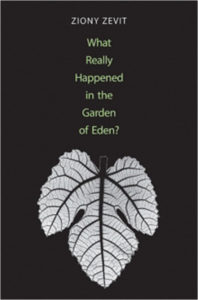
What Really Happened in the Garden of Eden?
Ziony Zevit
Yale Uni Press (2013)
Rs3,431
The Garden of Eden story, one of the most famous narratives in Western history, is typically read as an ancient account of original sin and humanity’s fall from divine grace. In this highly innovative study, Ziony Zevit argues that this is not how ancient Israelites understood the early biblical text. Drawing on such diverse disciplines as biblical studies, geography, archaeology, mythology, anthropology, biology, poetics, law, linguistics, and literary theory, he clarifies the worldview of the ancient Israelite readers during the First Temple period and elucidates what the story likely meant in its original context.
Most provocatively, he contends that our ideas about original sin are based upon misconceptions originating in the Second Temple period under the influence of Hellenism. He shows how, for Ancient Israelites, the story was really about how humans achieved ethical discernment. His study unsettles much of what has been taken for granted about the story for more than two millennia and has far-reaching implications for both literary and theological interpreters.
Ziony Zevit is Distinguished Professor of Biblical Literature and Northwest Semitic Languages and Literatures at the American Jewish University in Los Angeles. He is widely recognized for his publications in Hebrew epigraphy, biblical studies, and ancient Israelite religion.
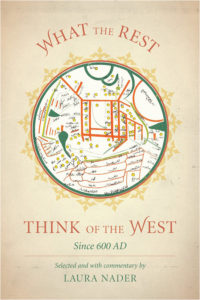
What the Rest Think of the West: Since 600 AD
Laura Nader
Uni of California Press (2015)
Rs4,569
Over the past few centuries, as Western civilization has enjoyed an expansive and flexible geographic domain, Westerners have observed other cultures with little interest in a return gaze. In turn, these other civilizations have been similarly disinclined when they have held sway. Clearly, though, an external frame of reference outstrips introspection—we cannot see ourselves as others see us. Unprecedented in its scope, What the Rest Think of the West provides a rich historical look through the eyes of outsiders as they survey and scrutinize the politics, science, technology, religion, family practices, and gender roles of civilizations not their own. The book emphasizes the broader figurative meaning of looking west in the scope of history.
Focusing on four civilizations—Islamic, Japanese, Chinese, and South Asian—Nader has collected observations made over centuries by scholars, diplomats, missionaries, travelers, merchants, and students reflecting upon their own “Wests.” These writings derive from a range of purposes and perspectives, such as the seventh-century Chinese Buddhist who goes west to India, the missionary from Baghdad who travels up the Volga in the tenth century and meets the Vikings, and the Egyptian imam who in 1826 is sent to Paris to study the French. The accounts variously express critique, adoration, admiration, and fear, and are sometimes humorous, occasionally disturbing, at times controversial, and always enlightening. With informative introductions to each of the selections, Laura Nader initiates conversations about the power of representational practices.
Laura Nader is Professor of Anthropology at the University of California, Berkeley.
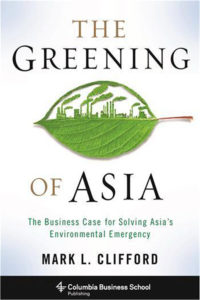
The Greening of Asia: The Business Case for Solving Asia’s Environmental Emergency
Mark L. Clifford
Columbia Uni Press (2015)
Rs3,425
One of Asia’s best-respected writers on business and economy, Hong Kong-based author Mark L. Clifford provides a behind-the-scenes look at what companies in China, India, Japan, Korea, the Philippines, Indonesia, Hong Kong, Singapore, and Thailand are doing to build businesses that will lessen the environmental impact of Asia’s extraordinary economic growth. Dirty air, foul water, and hellishly overcrowded cities are threatening to choke the region’s impressive prosperity. Recognizing a business opportunity in solving social problems, Asian businesses have developed innovative responses to the region’s environmental crises.
From solar and wind power technologies to green buildings, electric cars, water services, and sustainable tropical forestry, Asian corporations are upending old business models in their home countries and throughout the world. Companies have the money, the technology, and the people to act—yet, as Clifford emphasizes, support from the government (in the form of more effective, market-friendly policies) and the engagement of civil society are crucial for a region-wide shift to greener business practices. Clifford paints detailed profiles of what some of these companies are doing and includes a unique appendix that encapsulates the environmental business practices of more than fifty companies mentioned in the book.
Mark L. Clifford is the executive director of the Hong Kong-based Asia Business Council. During his prize-winning twenty-five-year career in journalism, he served as editor in chief of the South China Morning Post in Hong Kong and held senior editorial roles at BusinessWeek and the Far Eastern Economic Review. He has lived in Hong Kong since 1992.
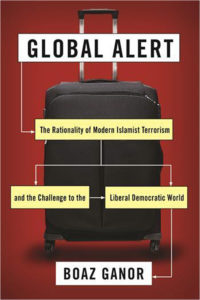
Global Alert: The Rationality of Modern Islamist Terrorism and the Challenge to the Liberal Democratic World
Boaz Ganor
Columbia University Press (2015)
Rs4,003
Many associate terrorism with irrational behavior and believe only lunatics could perpetuate such horrific acts. Global Alert debunks this myth by anatomizing the rationale behind modern terrorism. It draws a distinct picture of its root and instrumental causes and plots the different stages of a terrorist attack, from indoctrination and recruitment to planning, preparation, and launch.
Global Alert also exposes the measured exploitation of democratic institutions by terrorists to further their goals. Despite its strong capabilities and extensive resources, the modern liberal-democratic state is nevertheless subject to the rules of war, which partially restrict the state’s ability to operate and maneuver. Boaz Ganor shows how terrorist organizations exploit these values to paralyze or neutralize the states they oppose. In outlining this new “hybrid” terrorist organization and its activity in both the military–terrorist arena and the political–welfare arena, Ganor advances an international doctrine for governing military operations between state and nonstate actors as part of a new type of armed conflict termed “multidimensional warfare.”
Boaz Ganor is the founder and executive director of the International Institute for Counter-Terrorism (ICT), the Ronald Lauder Chair for Counter-Terrorism, and the dean of the Lauder School of Government, Diplomacy, and Strategy at the Interdisciplinary Center (IDC) Herzliya. He has served as an advisor and/or a consultant to the Israeli Counter-Terrorism Bureau, the Israeli National Security Council, and the Israeli Ministry of Defense.
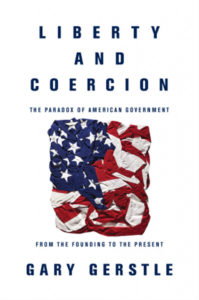
Liberty and Coercion: The Paradox of American Government from the Founding to the Present
Gary Gerstle
Princeton Uni Press (2016)
Rs4,447
American governance is burdened by a paradox. On the one hand, Americans don’t want “big government” meddling in their lives; on the other hand, they have repeatedly enlisted governmental help to impose their views regarding marriage, abortion, religion, and schooling on their neighbors. These contradictory stances on the role of public power have paralyzed policymaking and generated rancorous disputes about government’s legitimate scope. How did we reach this political impasse? Historian Gary Gerstle, looking at two hundred years of U.S. history, argues that the roots of the current crisis lie in two contrasting theories of power that the Framers inscribed in the Constitution.
One theory shaped the federal government, setting limits on its power in order to protect personal liberty. Another theory molded the states, authorizing them to go to extraordinary lengths, even to the point of violating individual rights, to advance the “good and welfare of the commonwealth.” The Framers believed these theories could coexist comfortably, but conflict between the two has largely defined American history. Gerstle shows how national political leaders improvised brilliantly to stretch the power of the federal government beyond where it was meant to go—but at the cost of giving private interests and state governments too much sway over public policy. The states could be innovative, too. More impressive was their staying power. Only in the 1960s did the federal government, impelled by the Cold War and civil rights movement, definitively assert its primacy. But as the power of the central state expanded, its constitutional authority did not keep pace. Conservatives rebelled, making the battle over government’s proper dominion the defining issue of our time.
From the Revolution to the Tea Party, and the Bill of Rights to the national security state, Liberty and Coercion is a revelatory account of the making and unmaking of government in America.
Gary Gerstle is the Paul Mellon Professor of American History at the University of Cambridge. His many books include American Crucible and The Rise and Fall of the New Deal Order (both Princeton). He lives in Cambridge, England, and Cambridge, Massachusetts.

